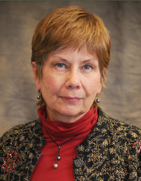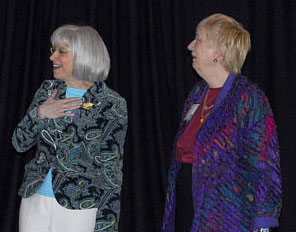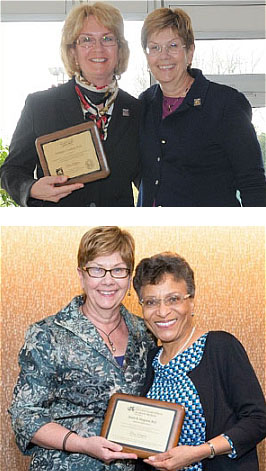
Diane Magrane
Director of Executive Leadership Programs
The January 2014 ELUM Professional Development program in San Antonio, Being Seen, Being Heard, Being Effective, was an energizing gathering of ELUMs from all over the country. I had the distinct pleasure of opening the second ELUM Professional Development program and did so by responding to a challenge from the ELAM advisory group to describe the ELUM community in five words (see sidebar). It brings me great joy to capture some of our accomplishments in this welcome address.
In the opening lesson of the ELUM session, Lily Garcia ('06) and Gretchen Wells ('11) introduced us to the concept of A Life in Five Words, which is a challenge to sum up one's life in just five words. Throughout the event, ELUMs summed up their thoughts on the ELUM community in five words, and these phrases (of which a few are below) were displayed for all to see.
- ELAM impact evolves over time
- Inspiring women move equity forward
- Grateful for this ELAM community
- Inspired me to "bring it"
- ELAM fellows strengthen our school
- Best thing I ever did!
- It's all about the scarf
- Empowering women's future through leadership
- A community of women leaders
- ELAM makes all things possible
- Connected team of strong women
- ELAM uncovers your unrealized potential

Rosalyn Richman and Page Morahan react to the generosity shown by the Class of 2009 at the time of their graduation.
We are here because of your generosity in giving back to ELAM. Although ELAM has always had a commitment to build and sustain its alumnae community, it never had the funds to do so until the Legacy Fund opened with the first class gift in 2009. The registration fees for the fellowship barely cover costs of materials, teachers, and staff. All of the services, the post-ELAM career counseling, the job postings, the receptions, and the research are now supported to a great extent with your institutions' Sustaining Memberships and to your own generous contributions of time, funds and energy. We have worked hard to get to this point.
At the time of the school's bankruptcy, when ELAM lost half of its endowment and its future was uncertain, a small number of alumnae formed SELAM (now WESH) to provide support to alumnae and the program. But, also because of the bankruptcy, the organization needed to open its doors to others outside of ELAM and to function as an independent volunteer organization. What the Legacy Fund did was to establish the alumnae organization within the Drexel structure and to ensure continuing professional development for the years following the fellowship. How did this happen? It began with the Class of 2009.
When Leslie Morrison unveiled the class gift, the generosity of the Class of 2009 surprised Page and Roz. The combined generosity of 2009 and 2010 surprised me; they reached my target of funds needed to begin planning a formal professional development program, a target that I thought would take three to four years. Our first professional development program in Nashville was a splendid event of honoring, connecting, greeting, and honing our negotiation skills. The Legacy Fund is now quite healthy, enough to guarantee semi-annual programming at least. Your continued giving keeps it so.
As a result of class giving, general giving, and speakers waiving and reducing fees, we are able to offer this top notch program, Being Seen, Being Heard, Being Effective. We are able to bring to you the best speakers, the best company, and the best confidantes as you have come to expect since your ELAM Fellowship. Thanks to alumnae, we have also been able to offer more receptions, including the AAMC GFA summer luncheon and receptions at both AAMC and ADEA annual meetings.
This year, the annual fundraising campaign captured a theme that Madhu Mazumdar ('12) has held as her personal post-ELAM theme: Give more, get more.
You have given generously; it allows us to give back (reciprocal getting, I guess).
A few specific thank-yous I'd like to make:
- Thank you to ELUMs Luanne Thorndyke ('02) and Maryellen Gusic ('09) for organizing Institutional Action Project peer consultations, and to our volunteer mentors for Institutional Action Project peer consultations.
- Thank you to the Class of 2013 for designating funds for the journals for this year's class.
- Thank you for initial and continuing class gifts, including anniversary gifts that honor those who are no longer with us, including Kim Ephgrave ('03) and Tana Grady-Weliky ('02).
- Thank you to the ELAM Class of 2003 – my own class, which I know from ELAM statistics remains one of the most connected and giving – for getting me here.
- Thank you to those who give throughout the year, including the checks that arrive in honor of David Bachrach's grandchildren (recognizing his work and the importance of ELAM to our teachers and coaches), those that acknowledge promotions that in some way result from ELAM, and to all of you who respond to the Annual Campaign.
- Thank you for the gifts of time and energy, for recruiting and supporting fellows for ELAM and for ELATE. Because of you, and the women faculty from Drexel engineering, our community is growing across campus as ELATE works to expand its class size and ELUM participation. ELATE ELUMs are beginning to appreciate the larger network and community.
For almost 20 years, thanks to the foresight of our founding director, Page Morahan, ELAM has been tracking the progress of its graduates. It is clear that ELAM makes a difference to the individuals who are privileged to participate and to the organizations that sponsor us. Our reputation is strong, our outcomes measures show impact, and our stories are powerful testaments of our growing on the leadership learning edge.

Top: ELUM Melanie Cushion ('11) and Diane Magrane.
Bottom: Diane Magrane and ELUM Anne Simpson ('13).
ELAM is a model of engaged, active learning of leadership that has led to the development and steady growth of our newest program, ELATE. ELATE lessons build on the curricular model; ELATE growth builds upon the testimonials of health science leaders and ELAM's reputation of results.
ELAM has made and continues to make a difference for all of us. Perhaps our individual stories tell it best:
When interviewed for the position … I prepared an executive summary, with my CV, and a three- to five-year plan for the College of Medicine. I was offered the job about two weeks later … The three- to five-year plan was a more indirect aspect of my ELAM training and came from my IAP … ELAM helped me have the confidence to consider the position … For all of this and the other items I left out. I owe you all a debt of gratitude. Thanks a million.
Melanie Cushion ('11)
How do you measure the inner strength that nudges you forward when the call comes to toss your hat in the ring or the true recognition that what you bring to the table is of great value? Listening, speaking up and speaking out … can be the result of a conscious appreciation of one's own value, skills and knowledge … and is ELAM.
Anne Simpson ('13)
Our collective stories take my breath away.
The legacy of ELAM is an amazing network of alumnae, consultants, and organizational leaders—including deans—who sponsored our fellowship participation and our projects. It is also the CFOs who patiently walked through spreadsheets and strategy year after year. It includes the men and women who benefit from our leadership and those who emulate us. (I used to tell my faculty "you can never not teach." For an ELUM, it's "you can never not lead." (Another five words!)
The actions set in place during ELAM to increase our confidence, skills, visibility and potential depend on:
- Our persistence, resilience, and execution.
- A network of leaders who support each other as they rise and as they fall and as they rise (we almost always rise again).
- A network that extends beyond the walls of this room, to other alumnae, coaches, consultants, mentors, sponsors, and adaptable families.
The success of ELAM and our organizations depends upon the kind of leadership instilled in us—collaborative and strategic, values based and forward-thinking, self-confident, powerful and generous. The kind of leadership that can face the revolution in health care, education, and research that is underway in the world today.
Fortunately, thanks to ELAM and this ELUM community, we are up to it.